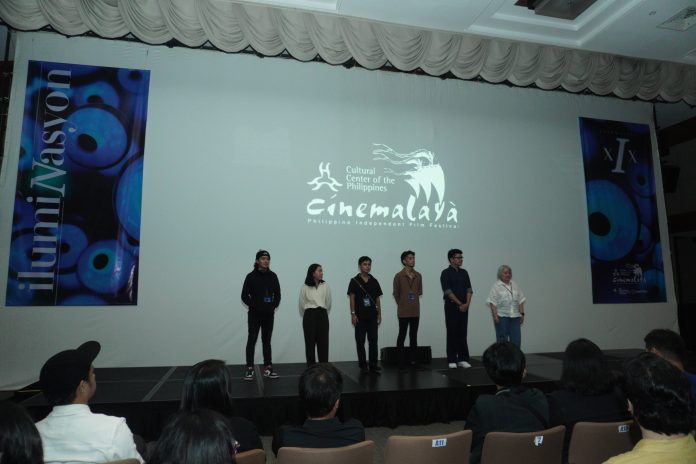“If you destroy my country, I will kill you.”
These are the words of former President Rodrigo Duterte that resonated in the documentary film “Maria” of the 19th Cinemalaya Independent Film Festival at the Philippine International Convention Center (PICC).
Two full-length films touching on human rights issues took the spotlight last Saturday – “Maria” by Sheryl Rose Andes and “Ang Duyan ng Magiting (The Cradle of the Brave)” by Dustin Celestino.
The documentary by Andes follows three women named Maria after the bloodbath of Duterte’s drug war: a staunch supporter turned victim, a wife mother fighting for their rights, and a woman (vice president Leni Robredo) who became a beacon of hope.
Andes noted that in the Philippines, where there is shrinking civic and democratic space and a culture of impunity, these Marias are on the journey of seeking truth and fighting for justice.
At least 6,252 people were killed during anti-illegal drug operations as of May 31, 2022. This number excludes victims of vigilante-style killings or extrajudicial killings (EJK), which according to human rights groups, pulls the number up to around 30,000.
The wives and mothers of the killed victims are left trying to meet both ends for their families.
Only a few have been convicted in drug war-related killings, including the policemen involved in the deaths of 17-year-old Kian delos Santos, Carl Angelo Arnaiz, and Reynaldo “Kulot” de Guzman.
Atty. Kristina Conti of the National Union of People’s Lawyers (NUPL) discussed the legal battle of the families as well as the ongoing investigation of the International Criminal Court (ICC) for alleged crimes against humanity during Duterte’s term due to alleged systematic killing of citizens in pursuit of a state policy of anti-drug war.
The Supreme Court ruled on July 2021 that Duterte cannot invoke the Philippines’ withdrawal from the Rome Statute to skirt the ICC investigation as he could not arbitrarily terminate international agreements without the concurrence of the Senate.
The ICC denied last month the Philippine government’s appeal to stop its investigation.
“Documentaries shine in darkness. May this film be a light in finding truth and justice like what my Marias are looking for,” Andes said.
“Ang Duyan ng Magiting” is a film about corruption within the government system and the police. It was written at the height of red-tagging and EJK provides a perspective on the socio-political climate in the Philippines.
It is an anthology of interwoven narratives on life and terrorism in the country following a college professor, university chancellor, social worker, police chief, lawyer, two mothers, and two pupils.
It revolves around the journey of a young activist student named Jose, who was detained as a suspect in the church bombing.
Celestino said that the film “is a criticism of the impulsive violence that was normalized during the last half-decade of our country’s history and a reminder that everything we do has far-reaching consequences.”
He added that “it is a film about grief. It is a contemplation and a meditation on the agony of an entire nation. The film grieves for the courageous men and women who have suffered in the name of nation and nationalism.”
The movie touched on the issue of red-tagging which is a pernicious practice as part of the government’s counterinsurgency efforts that target individuals or organizations critical or not fully supportive of the actions of a sitting administration.
This includes publicly accusing activists, journalists, politicians, and organizations as either communists or terrorists or both, regardless of their actual political beliefs or affiliations.
Civil society groups working on human rights issues have been demonized and vilified under the Duterte administration and reported increased surveillance, intimidation, threats, and other acts of harassment by the authorities.
“It is a story of what our country recently went through and the recognition of the victims’ experiences,” says Dolly de Leon who portrays a social worker tasked to assist the detained student.
On 3 July 2020, President Duterte signed into law the “Anti-Terrorism Act of 2020” which human rights groups criticized for containing dangerous provisions further undermining human rights in the country.
Duyan and Maria are two of this year’s ten (10) full-length films which also include “As If It’s True” by John Rogers; “Bulawan Nga Usa” (Golden Deer) by Kenneth De La Cruz; “Gitling” by Jopy Arnaldo; “Huling Palabas” by Ryan Machado; “Iti Mapupukaw” (The Missing) by Carl Joseph Papa; “Rookie” by Samantha Lee; “Tether” by Gian Arre; and “When This is All Over” by Kevin Mikhail Mayuga. The short film section also has ten competing entries.
Atty. Dennis R. Gorecho heads the seafarers’ division of the Sapalo Velez Bundang Bulilan law offices. For comments, e-mail [email protected], or call 09175025808 or 09088665786
The views expressed in this article are the opinions of the author and do not necessarily reflect the editorial stance of LICAS News.









